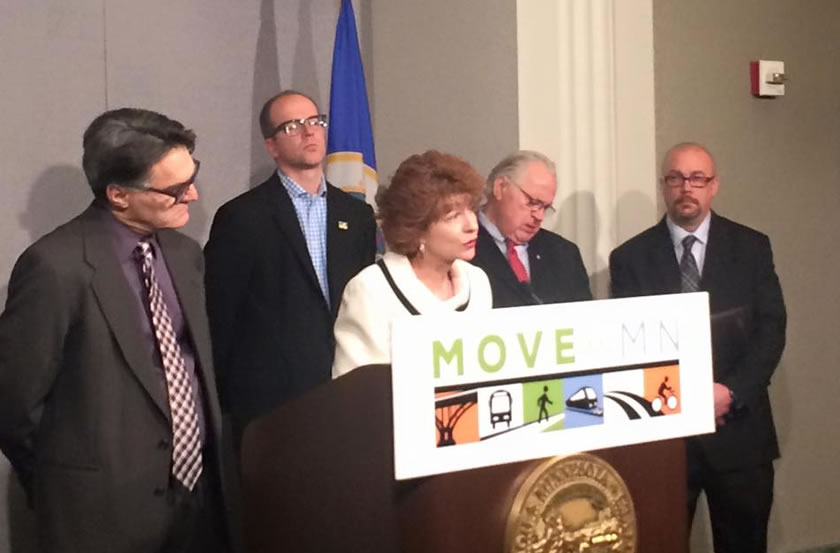

Share
Saying that transportation needs can’t wait, a coalition that includes organized labor announced a 10-year plan Thursday for fixing Minnesota’s roads and bridges, expanding access to transit and improving safety.
The MoveMN coalition calls for a 10-year commitment to improve Minnesota’s transportation infrastructure and create an efficient, reliable network that helps the state remain economically vibrant. A state task force last year concluded that Minnesota is falling about $1.5 billion short each year from what it needs to fix and expand core transportation infrastructure.
“You can’t compete in a 21st century economy with 20th century transportation infrastructure,” said Doug Peterson, president of the Minnesota Farmers Union, which is one of the more than 200 coalition partners. “The choice is really simple: You can build it or you can get left behind.”
“The state knows how to fix the problem, but lacks the funding to do so,” said Dean Meyer, a vice president for United Farmers Cooperative. “We need solutions, not workarounds.”
Move MN co-chair Margaret Donahoe stressed that the coalition is pushing an efficient, sustainable, long-term plan, not the patchwork approach that Minnesota currently relies upon. Move MN’s plan is similar to what Gov. Mark Dayton outlined to the Minnesota Chamber of Commerce the night before, but contrasts sharply with what House Republican leadership unveiled earlier in the day.
The GOP would raid selected parts of the state budget to scrape together $750 million more for roads over the next four years. They would not raise any taxes or user fees.
Move MN, on the other hand, pays for its vision through a combination of cost savings and new, dedicated revenue, which it estimates at $856 million a year.
Donahoe said the Republican proposal is not a solution. Given the state’s recent history of budget deficits, she said, relying on uncertain General Fund money “is more than a little risky.” The Republican approach also avoids the basic principle that user fees fund transportation. “People who use the roads ought to pay for them,” she said.
Move MN’s proposal would:
1. Apply the state’s existing 6.5% sales tax to wholesale fuel. That would raise $422 million a year, dedicated exclusively to roads and bridges. When translated at the pump, the wholesale tax would cost drivers about 14 cents a gallon.
2. Increase vehicle tab fees by 10 percent. Higher tab fees, which Donahoe says have not increased since the 1980s, would raise $60 million a year. This money also would be dedicated exclusively to roads and bridges.
3. Increase the local sales tax by ¾ of one cent in Anoka, Carver, Dakota, Hennepin, Ramsey, Scott, and Washington counties. That would raise $342 million a year, with 90 percent dedicated to transit and the remaining 10 percent dedicated to building bike and pedestrian infrastructure. Move MN’s other co-chair, Dave Van Hattum, said this would cost metro-area residents about $1.30 a week – about the same as a cup of coffee.
4. Close a loophole that exempts leased vehicles from the motor vehicle sales tax. That would raise $32 million a year, which would be dedicated to transit in other suburban counties and in Greater Minnesota.
5. Reallocate $16 million in existing federal transportation funds and dedicate them to building bike and pedestrian infrastructure for safer routes to work and school in those same areas outside the Metro.
In addition, the coalition says it will support changes in law to help cities and counties repair local streets. Counties typically rely on local property taxes for about 70 percent of their road repairs, Van Hattum says; in cities, that is more than 90 percent.
Move MN is a statewide coalition of more than 200 business, labor and other organizations and local governments committing to fixing Minnesota’s long-term transportation problems by securing a comprehensive transportation funding solution.

